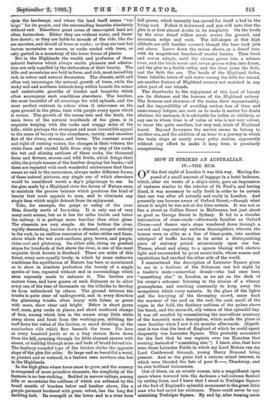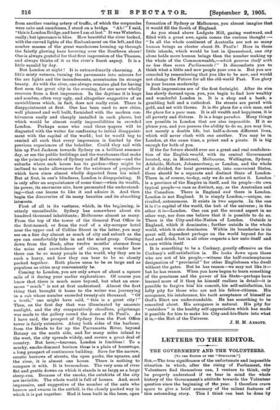O N the first night of London it was this way.
Having dis- posed of a small amount of luggage in a hotel bedroom, which, after six weeks of a ship's cabin, gave an impression of vastness similar to the interior of St. Paul's, and having dined, it was necessary to sally forth in order to be certain that one was after all actually and really in London. And presently one became aware of Oxford Street,—though what street it might be was not at the time certain. It was not as fine a street as Collins Street in Melbourne, but just about as good as George Street in Sydney. It led to a circular intersection of cross-roads—afterwards familiar as Oxford Circus—and thence one's steps wandered down through a curved and impressively uniform thoroughfare, wherein the houses were as alike as a line of fence-posts, into another whirlpool of traffic having in its midst a distinguishing piece of statuary poised miraculously upon one toe. Thence, about and along, to a square blazing with electric light and surrounded by great music-balls, whose names and reputations had reached the other side of the world.
I remembered the description of Leicester Square given to me in a harbour of the Solomons one hot night by a trader's mate—somewhat drunk—who had once been "something else" in London, as we sat on the deck of his owner's schooner listening to the strains of a wheezy gramaphone, and smoking constantly to keep away the mosquitoes which carry malaria. In the glare of the lights and the hurrying of the thronging crowd, came back the murmur of the surf on the reef, the rank smell of the copra in the hold, the feathery outlines of the palms above the beach, and the moon-lit, oily waters of that splendid bay. It was all recalled by remembering the marvellous accuracy of the homesick man's description, which made the place at once familiar when I saw it six months afterwards. (Signifi- cant it was that the best of England of which he could speak eloquently was Leicester Square. This probably accounted for the fact that he was captain over ten Kanakas that evening, instead of "something else.") I knew, also, that here were those Leicester Fields in which my Lord Mohan ran my Lord Castlewood through, young Harry Esmond being present. And so the place had a curious mixed interest, in which were blended the fate of poor Z—, Thackeray, and its own brilliant viciousness.
Out of there, on an erratic course, into a magnificent open space where towered into the darkness a tall column flanked by resting lions, and I knew that I stood in Trafalgar Square at the foot of England's splendid monument to the great little man who had saved her existence. There could never be any mistaking Trafalgar Square. By and by, after turning aside
from another roaring artery of traffic, of which the corpuscles were cabs and omnibuses, I stood on a bridge. "Ah!" I said, "this is London Bridge, and here I am at last." It was Waterloo, really; but ignorance is bliss. How beautiful the river looked, with the curved lights of the Embankment on the left, and the sombre masses of the great warehouses looming up through the faintly glowing haze hovering over the Southern shore ! One is always grateful for that first impression of the Thames, and always thinks of it as the river's finest aspect. It is a little squalid by day.
But London at night ! It is extraordinarily charming. A Mee misty wetness, turning the pavements into mirrors for the arc lights and the incandescents, accentuates its strange beauty. As with the river, one always remains glad for having first seen the great city in the evening, for one never wholly recovers from a first impression. In the daytime it is huge and sombre, often very ugly, and altogether suggestive of an nnwieldiness which, in fact, does not really exist. There is disappointment at first. One has been used to new cities, well planned and well built, furnished with the modern con- trivances easily and cheaply installed in such places, but which would be almost costly impossibilities in crowded London. Perhaps some who read these papers will be disgusted with the writer for confessing to initial disappoint- ment with the capital of the world ; but he would beg to remind all such that every impression is limited by the previous experiences of the beholder. Could they sail with him up Port Jackson towards Sydney on a brilliant summer day, or see the public buildings and the warehouses that make up the principal streets of Sydney and of Melbourne—and the suburbs where each house has its garden—they might be inclined to make allowances for the existence of prejudices which have since almost wholly departed from his mind. But at first, in one's blindness, London is disappointing. It is only after an acquaintance of some time—when its wealth, its power, its enormous size, have permeated the understand- ing—that one learns to like it and admire it. And then begin the discoveries of its many beauties and its absorbing interests.
First of all is its vastness, which, in the beginning, is utterly unrealisable. Sydney has somewhere about six hundred thousand inhabitants ; Melbourne almost as many. From the top of the tower of the General Post Office in the first-named, or from the roof of a sky-scraper hotel near the upper end of Collins Street in the latter, you may see on a fine day almost as much of city and suburb as the eye can comfortably take in and the mind grasp. Coming down from the Bush, after twelve months' absence from the noise and crowdedness of cities, you wonder how there can be so many people in the world, why they are in such a hurry, and. how they can bear to be so closely packed together. Both places seem to be as large and as populous as cities may conveniently be.
Coming to London, you are only aware of about a square mile of it during your earlier explorations. Of course you know that there is much more beyond, but what an enor- mous "much" is not at first understood. Almost the first thing that brought it home to the writer was journeying in a cab whose number exceeded twenty-six thousand. "Of a truth," one might have said, "this is a great city ! " Then, on the first day that was illuminated by anaemic sunlight, and the sky comparatively cloudless, pilgrimage was made to the gallery round the dome of St. Paul's. As I have said, the prospect of Sydney from the Post Office tower is fairly extensive. Along both sides of the harbour, from the Heads to far up the Parramatta River, beyond Botany on the south side, and for many miles inland to the west, the city spreads widely, and covers a great deal of country. But here,—heavens, London is limitless ! To a murky, smoke-dimmed horizon these is a plain of housetops, a long prospect of continuous building. Save for the narrow, erratic burrows of streets, the open parks, the squares, and the river, it is almost one house. There is nothing to compare it with. It is tremendous. The very area of river fiat and gentle downs on which it stands is as largq as a large sheep-run. Because of the smoke, the outskirts of the city are invisible. The whole world is full of houses. And, most impressive, and suggestive of the number of the ants who burrow and swarm in the anthill, is the closely packed way in which it is put together. Had it been built in the loose, open
formation of Sydney or Melbourne, you almost imagine that it would fill the South of England.
As you stand above Ludgate Hill, gazing westward, and filled with a great awe, again comes the curious thought :—
"In all the whole continent of Australia are not so many human beings as cluster about St. Paul's ! Here in these little islands, which would be lost in Queensland, one city alone holds more human beings than the number making up the whole of the Commonwealth,—which governs itself with. no less than. seven Parliaments ! " It discomforts you to think what a little and new people your own is. But you are consoled by remembering that you like to be new, and would not change the Future for all the old-world Past. You glory in your brazen modernity.
Such impressions are of the first fortnight. After its size has slowly dawned upon you, you begin to find how wealthy
and wonderful London is. It is a shop and a bank, a
gambling hell and a cathedral. Its streets are paved with gold, and set with thorns. It is the place for a rich man, and the place for a poor man. It is all wealth and happiness, it is
all poverty and distress. It is a huge paradox. Many things are possible in London that are also impossible. If it ao
please you, and you possess the ability to do so, you may live, not merely a double life, but half-a-dozen different lives, which will never clash with one another. You may be in London, at the same time, a priest and a pirate. It is big enough for both of you.
If the far future should ever see a great and real confedera- tion of the English World, with its central Government located, say, in Montreal, Melbourne, Wellington, Sydney, Adelaide, Hobart, Johannesburg, or London, and the whole of it divided, for local government, into convenient States, there should be a separate and distinct State of London.
There is, of course, to-day, only we do not notice it. London is a province of the Empire in itself, and its people—its own typical people—a race as distinct, say, as the Australian and the Canadian. There is England and there is London. London is not England. It is simply London,—unique, un- rivalled, autonomous. It exists in two aspects. , In the one
it is tie capital of the world, the hub of the universe ; in the other it is—London. One can put the second aspect in no
other way, nor does one believe that it is possible to do so.
There is the City-and-the-Nation of London. Outside is England, which it dominates ; further outside is the whole
world, which it also dominates. Within its boundaries is its great self, dependent perhaps on the world beyond for its food and drink, but in all other respects a law unto itself and a race within itself.
It is something to be a Cockney, greatly offensive as the Cockney's self-satisfaction is. He looks down upon those who are not of his people,—witneas the half-contemptuous
designation of "provincial" for other Englishmen who dwell without the gates. But he has reason—we may not like it— but he has reason. When you have begun to learn something of the greatness and the power of his State—perhaps have learned more of it than he himself realises in detail—it is possible to forgive himi his conceit, his self-satisfaction, his lofty pity for those who are not his fellow-citizens. His arrogance, his intolerance, his tacit acceptance of himself aa God's Elect are understandable. He has something to be conceited about. His arrogance is natural. His pity for " outsiders " is the healthy self-appreciation which has made it possible for him to make his City-and-his-State into what it is,—the Hub of the Universe. J. H. M. ABBOTT.



































 Previous page
Previous page